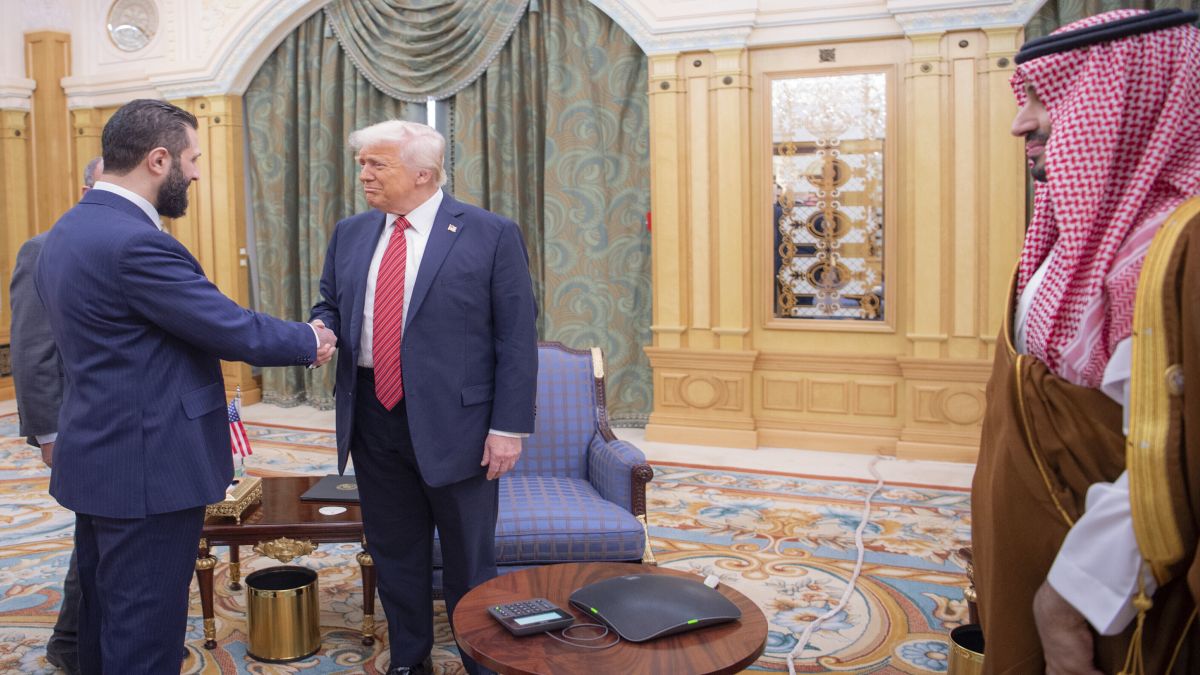As Donald Trump continues his West Asia visit, the country of Syria broke out in celebrations as the US president announced plans to lift crippling sanctions on Syria, marking a major policy shift by Washington after 14 years of civil war.
The country has been isolated by the United States and European Union sanctions over the conflict, a 1979 designation as a state sponsor of terrorism and close ties between Damascus and Iran.
Reacting to the announcement, Syrian interim President Ahmed al-Sharaa said Trump’s move “was a historic and courageous decision, which alleviates the suffering of the people, contributes to their rebirth and lays the foundations for stability in the region”.
“Syrians, the road before us is still long. Today we begin the real work, with which modern Syria will be reborn,” Sharaa added.
Soon after Trump’s announcement , social media was flooded with videos from Damascus, showing hundreds of men, women, and children gathered at Umayyad Square, with music blasting in the background. While some people were seen dancing and waving Syrian flags, others drove by in their cars, with an anticipation of a better life palpable in their celebrations.
But what will be the true impact of lifting these sanctions?
What have been the US sanctions on Syria?
Washington has imposed three sanctions programmes on Syria. In 1979, the country was designated a “state sponsor of terrorism” because its military was involved in neighbouring Lebanon’s civil war and had backed armed groups there, and eventually developed strong ties with the powerful Hezbollah group.
In 2003, then-President George W Bush signed the Syria Accountability Act into law, as his administration faced off with Iran and Tehran-backed governments and groups in the Mideast. The legislation focused heavily on Syria’s support of designated terror groups, its military presence in Lebanon, its alleged development of weapons of mass destruction, as well as oil smuggling and the backing of armed groups in Iraq after the US-led invasion.
In 2019, during Trump’s first term, he signed the Caesar Act, sanctioning Syrian troops and others responsible for atrocities committed during the civil war.
Caesar is the code name for a Syrian photographer who took thousands of photographs of victims of torture and other abuses and smuggled them out of the country. The images, taken between 2011 and 2013, were turned over to human rights advocates, exposing the scale of the Syrian government’s brutal crackdown on political opponents and dissidents during countrywide protests.
What has been the impact of US sanctions on Syria?
The sanctions — along with similar measures by other countries — have touched every part of the Syrian economy and everyday life in the country.
They have led to shortages of goods from fuel to medicine, and made it difficult for humanitarian agencies responding to receive funding and operate fully.
Companies around the world struggle to export to Syria, and Syrians struggle to import goods of any kind because nearly all financial transactions with the country are banned. That has led to a blossoming black market of smuggled goods.
Simple tasks like updating smartphones are difficult, if not impossible, and many people resort to virtual private networks, or VPNs, which mask online activity, to access the internet because many websites block users with Syrian IP addresses.
The impact was especially stark after a devastating 7.8 magnitude earthquake hit Turkey and northern Syria in February 2023, compounding the destruction and misery that the war had already brought.
Though the US Treasury issued a six-month exemption on all financial transactions related to disaster relief, the measures had limited effect since banks and companies were nervous to take the risk, a phenomenon known as over-compliance.
Interim Syrian President Ahmad al-Sharaa — who led the insurgency that ousted President Bashar Assad — has argued the sanctions have outlived their purpose and are now only harming the Syrian people and ultimately preventing the country from any prospect of recovery.
Trump and al-Sharaa met Wednesday.
Washington eased some restrictions temporarily in January but did not lift the sanctions. Britain and the European Union have eased some of their measures.
What would lifting the sanctions mean for Syria?
After Trump’s announcement, Syria’s currency gained 60 per cent on Tuesday night — a signal of how transformational the removal of sanctions could be.
Still, it will take time to see any tangible impact on Syria’s economy, experts say, but removing all three sanctions regimes could bring major changes to the lives of Syrians, given how all-encompassing the measures are.
It could mean banks could return to the international financial system or car repair shops could import spare parts from abroad. If the economy improves and reconstruction projects take off, many Syrian refugees who live in crowded tented encampments relying on aid to survive could decide to return home.
“If the situation stabilised and there were reforms, we will then see Syrians returning to their country if they were given opportunities as we expect,” Lebanese economist Mounis Younes told the Associated Press.
The easing of sanctions also has an important symbolic weight because it would signal that Syria is no longer a pariah, said Shaar.
Mathieu Rouquette, Mercy Corps’ country director for Syria, said the move “marks a potentially transformative moment for millions of Syrians who have endured more than 13 years of economic hardship, conflict, and displacement.”
But it all depends on how Washington goes about it. “Unless enough layers of sanctions are peeled off, you cannot expect the positive impacts on Syria to start to appear,” said Shaar. “Even if you remove some of the top ones, the impact economically would still be nonexistent.”
With inputs from Associated Press
)